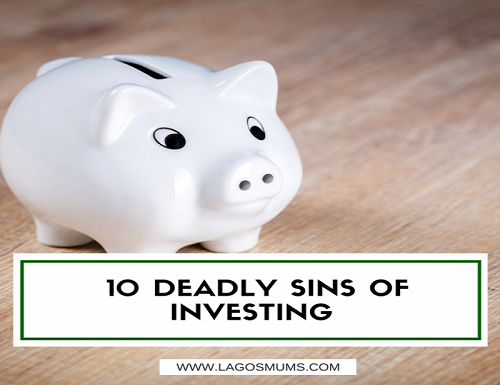From time to time, we will all make some financial blunders. Some people make bigger ones than others. What is more important than making such mistakes, is learning from them. Here are 10 deadly sins of investing that investors should avoid at all costs.
-
Jumping on the bandwagon
If everyone else is buying it, it seems like a good idea to join in, right? It is not. Investors are most vulnerable when emotions come into play. When markets nosedive, many “investors” bail out, when the markets remain undervalued, they do nothing, and when the markets begin to recover and start to soar, they regain their confidence, jump on the bandwagon and dive back in and the cycle continues. Remember what warren Buffet says “Be fearful when others are greedy and be greedy when others are fearful”.
[Tweet “Greed causes investors to lose enormous amounts of money.”]
2. Not paying attention
You worked hard for your money so you ought to pay attention to what is happening to it, even if you have a financial advisor. Portfolios must be tended to on a regular basis, by rebalancing the allocation, selling off some positions, and taking profits from winners. Letting a portfolio drift without reviewing it, means your investments are less likely to adequately meet your goals.
3. Putting short-term funds in the stock market
The money you place in the stock market should be to fund your long-term goals. Putting next term’s school fees in the stock market could be a deadly mistake when it comes to investing.
4. Putting all your money in one investment
There are too many horror stories of people having almost all their money tied up in one investment. It is tempting to concentrate your available funds in just one or two investments that appear to be doing very well, but this can be very risky. One of the best ways to manage risk is to diversify: to own investments in a variety of categories, including domestic stocks, foreign stocks, bonds, and property. If one investment performs badly or fails, a variety of different types of investments are less likely to.
5. Not having a financial plan
Most people live from day to day adopting a “spend as you go” lifestyle with no clear plan in place to save for specific future events or protect their families from unforeseen circumstances. The adage “if you fail to plan, you plan to fail” highlights the importance of having a clearly defined plan or achievable goal in place that you can work towards. Apart from maybe winning the lottery, or inheriting a fortune, financial success doesn’t just happen. If you don’t plan for major life events, you might not have the outcome you envisaged.
6. Not paying back money you owe
One of the worst mistakes you can ever make is not paying back money that you owe; this might be a large financial loan or a small personal loan from a relative or friend. Whether it is to tide you over a difficult patch or to borrow to start your small business, we all from time to time need to borrow. If you are notorious for not repaying your debt, it will eventually come back to haunt you as no one will want to lend you money as your character is in doubt.
7. Not understanding what you are investing in
Putting your money in investment vehicles that you do not understand or getting involved in some of those “get-rich-quick” scams like MMM can have devastating consequences. Invest only in what you understand and try to make financial decisions based on adequate research and advice from experienced and tested professionals. Don’t be enticed by abnormal returns if something sounds too good to be true, it probably is too good to be true.
8. Not having adequate insurance
Most Nigerians are under-insured. Not having adequate insurance can have a devastating effect on your finances. Yet the simple payment of the annual premium could help one avoid this. Accidents do happen. Nobody wants to be left paying expensive hospital bills or losing their home in a fire without insurance. Don’t let your policies lapse, as the consequences can be grave for you and your family.
9. Borrowing to buy an asset that you can’t afford
Remember that by borrowing money to buy a car, you are paying interest on an asset that starts to lose value from the moment you leave the car showroom. Of course, many people have no choice but to take out a loan to buy a car. Some vehicles are very expensive to buy, insure, fuel and maintain. If you need to buy a car and must borrow to do so, consider buying one that is affordable, fuel-efficient and with reasonable maintenance costs.
Likewise avoid borrowing to buy a property that you can barely afford; this can put your finances in jeopardy as the payments become unmanageable. Affordability is key when you are financing an asset.
10. Putting money above everything else
While most people don’t do enough towards achieving financial success, there are others whose priorities have become so warped that money takes the first position in their lives. Remember that money is simply a tool, a means to an end and should never be considered the end itself. When a life is consumed by money, greed and corruption set in with far reaching and dire consequences.



